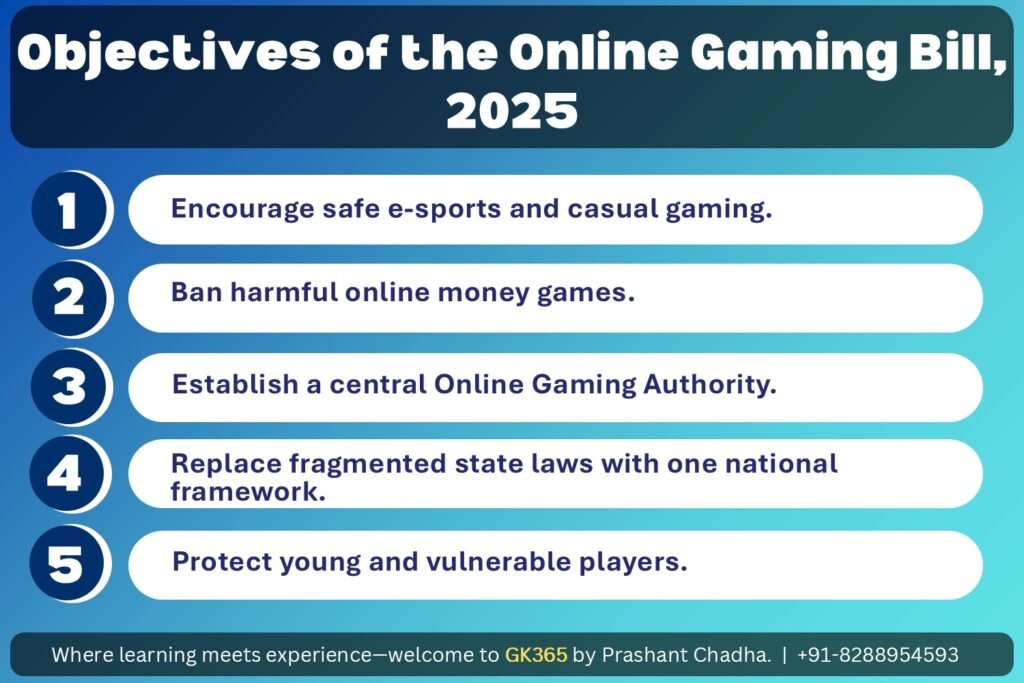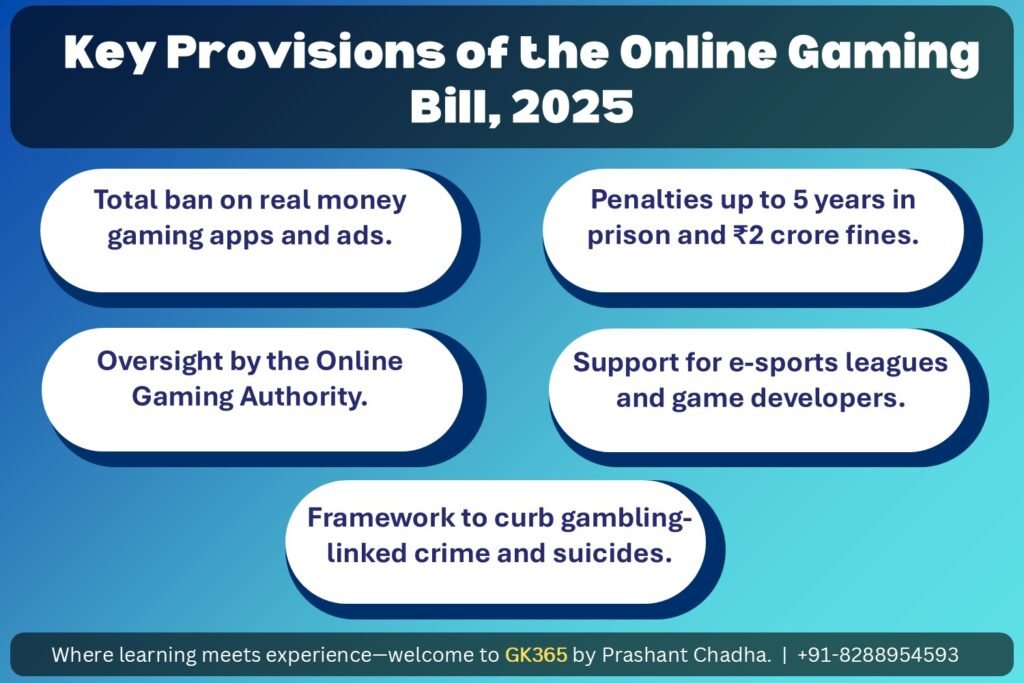The Promotion and Regulation of Online Gaming Bill, 2025: A Turning Point for India’s Digital Entertainment Sector
Table of Contents
Introduction
The Promotion and Regulation of Online Gaming Bill, 2025 is India’s first national framework for online gaming. It encourages e-sports and casual play while banning money-based games tied to debt and suicides. The law reflects a balance between digital innovation and public safety.
Historical Context of Online Gaming in India
Over the last decade, India’s online gaming sector grew rapidly. Affordable smartphones, widespread internet, and digital payments brought in over 500 million gamers by 2024. Yet laws varied. Some states banned real money games, while others allowed them under “skill-based” definitions. This gap enabled gambling apps to expand despite opposition.
Objectives of the Online Gaming Bill, 2025
The Bill aims to:
- Encourage safe recreation through e-sports and social gaming.
- Eliminate harmful money gaming platforms.
- Create a central authority for oversight.
- Replace state-level inconsistencies with one national law.
- Protect young and vulnerable users.
Defining the Three Categories of Online Games
E-sports
Competitive, skill-based games played in leagues or tournaments. Titles include strategy and multiplayer battle formats. The Bill supports e-sports as a career path.
Online Social Games
Casual games played without monetary rewards, such as puzzles, quizzes, and multiplayer adventures. These are promoted as harmless entertainment.
Online Money Games
Games requiring deposits or stakes for financial returns, such as Rummy, Poker, and fantasy betting. The Bill bans these outright as addictive and harmful.
Institutional Mechanisms and the Online Gaming Authority
The Bill creates an Online Gaming Authority to:
- Coordinate national policy.
- License and register e-sports events.
- Support developers with grants and training.
- Encourage arenas and digital hubs.
- Monitor compliance with safety and content rules.
Prohibition of Online Money Games
Nature of the Ban
The Bill bans hosting, advertising, or promoting real money gaming platforms in India.
Rationale for the Ban
These platforms were linked to 32 suicides in less than three years. Families reported bankruptcies, harassment from lenders, and debt traps. Authorities also tied platforms to fraud and laundering.
Global Comparisons
The UK regulates gambling with licenses, while China restricts online play time for minors. India’s ban is driven mainly by public health and safety.
Penalties and Enforcement Provisions
Penalties include:
- Up to three years in prison and ₹1 crore fines for first offenses.
- Three to five years in prison and fines up to ₹2 crore for repeat offenders.
Authorities can block illegal sites and prosecute offenders under criminal law.
Addressing Social Concerns and Public Safety
Addiction and Mental Health
Money games use reward loops similar to slot machines. Psychologists note that these designs trigger compulsive play, especially in youth.
Financial Risks and Family Burden
Families across states reported debts in the lakhs, property loss, and forced loans due to addiction.
Suicides Linked to Online Gambling
Between 2022 and 2024, dozens of suicides were linked directly to gaming losses. This created strong public demand for reform.
National-Level Legal Framework
The Bill ends conflicting state laws. Before 2025, states such as Tamil Nadu and Andhra Pradesh banned money games, while others allowed them. The new central law overrides state-level ambiguity and provides a single standard.
Economic and Security Implications
Two risks drove urgency:
- Economic harm: Families lost savings, reducing household spending.
- Security risks: Enforcement agencies found gambling apps used for hawala and terror financing.
Government’s Vision and Ministerial Statements
Union IT Minister Ashwini Vaishnaw said the Bill reflects Digital India’s vision of safe, creative, and responsible growth. He stressed that innovation must not come at the cost of welfare.
Support for E-sports and Game Development
The law promotes e-sports through tournaments, university tie-ups, and support for developers. Grants, credit, and access to infrastructure are part of the plan. This opens opportunities for India to become a center for global e-sports.
Reaction from Industry and Civil Society
- E-sports firms welcomed the move as recognition of gaming as a profession.
- Money gaming companies criticized the ban as harmful to jobs.
- Civil society groups backed the law, citing family tragedies and mental health impacts.
Potential Challenges in Implementation
Challenges include:
- Blocking offshore platforms, which requires international cooperation.
- Legal disputes, with companies arguing games like Rummy involve skill.
- Costs of technical and financial enforcement.
Long-Term Outlook for India’s Gaming Sector
The Bill lays the base for a regulated, safe, and creative gaming market. Expected trends include:
- Growth in e-sports leagues with global reach.
- Expansion of domestic game development.
- Decline in gambling-linked crime and financial distress.
Conclusion
The Online Gaming Bill, 2025 is a landmark in India’s digital policy. It balances support for e-sports with a strict ban on money gaming. With penalties, central oversight, and strong government backing, it creates a safer environment for players and a stronger base for industry growth. The Bill answers public demand for reform and positions India to lead in regulated digital entertainment.
Key Takeaways Table
| Aspect | Details |
|---|---|
| Purpose | Balances digital innovation with public safety. |
| Categories Defined | E-sports, Online Social Games, Online Money Games. |
| Main Ban | Prohibits online money games like Rummy, Poker, and betting apps. |
| Enforcement | Up to 5 years imprisonment, ₹2 crore fines, and site blocking. |
| Public Concerns Addressed | Addiction, financial distress, and suicides linked to gambling. |
| Economic & Security Risks | Money games tied to fraud, hawala, and terror financing. |
| Future Outlook | Growth in e-sports, game development, and safe digital recreation. |



